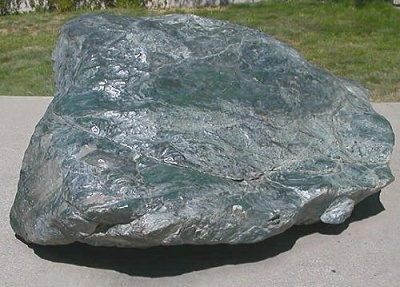|
Serpentinite
|
|
|
A polished sample of Serpentinite Rock photo: http://geology.about.com/library/bl/images/blserpentinite.htm |
|
|
The presence of Serpentinite has a large impact on the landscape of Cal Poly, both geologically and biologically. Serpentine is a metamorphic rock which forms a unique serpentine soil in the process of weathering. As serpentinite soil is rather unique and chemically unstable, it does not have the capacity to hold large amounts of water. This effect makes hydration for plants difficult, leaving the land lightly forested if not eroded. In this manner, much of our Cal Poly landscape is identified. Serpentine soils and rock also contain heavy metal impurities (especially iron and nickel), which are toxic to most plants. Specially adapted plants have evolved to grow freely without the hazardous levels of toxic elements, some of which are unique to San Luis Obispo. Research is ongoing to use these plants as “clean-up” tools for areas contaminated with heavy metals, as well as the specially-adapted insects that can feed on plants that concentrate heavy metals. Types of serpentine rock are also used in jewelry because of their resemblance to jade. Serpentinite is found throughout Northern and Central California, and is so predominant that it is the California state rock.
For more information, please visit:
Website team: William Holland, Merritt Cutten, Wesley Schweikhard, Jeannette Osterloh, Patrick Cunning
|

